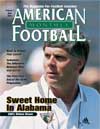AMERICAN FOOTBALL MONTHLY THE #1 RESOURCE FOR FOOTBALL COACHES
Article CategoriesAFM Magazine
|
Buried TreasureIn a state dominated by Alabama and Auburn, UAB\'s Watson Brown is proving that numbers can be deceiving.by: Richard Scott © More from this issue It's so easy to be wrong about what you see on the surface. So easy to dismiss the dirt on the surface and ignore the treasure below. Sometimes it takes a little more time and effort to dig for what really matters, for something precious, for the truth. When it comes to UAB head coach Watson Brown, it's easy to see the record and miss the point. It's easy to see his .378 winning percentage and draw knee-jerk conclusions. It's easy to see those 112 losses, compare them to 68 wins and one tie over 16 seasons and make rash assumptions. For Brown, the treasure isn't in the championship rings he doesn't own or wear on his fingers. It's somewhere deeper, somewhere beyond the numbers and the records. Brown has never taken the easy route in his coaching career, and anyone who really knows him, anyone who's ever been past the ....The full article can only be seen by subscribers.
|
|
|||||||
| HOME |
MAGAZINE |
SUBSCRIBE | ONLINE COLUMNISTS | COACHING VIDEOS |
Copyright 2026, AmericanFootballMonthly.com
All Rights Reserved





